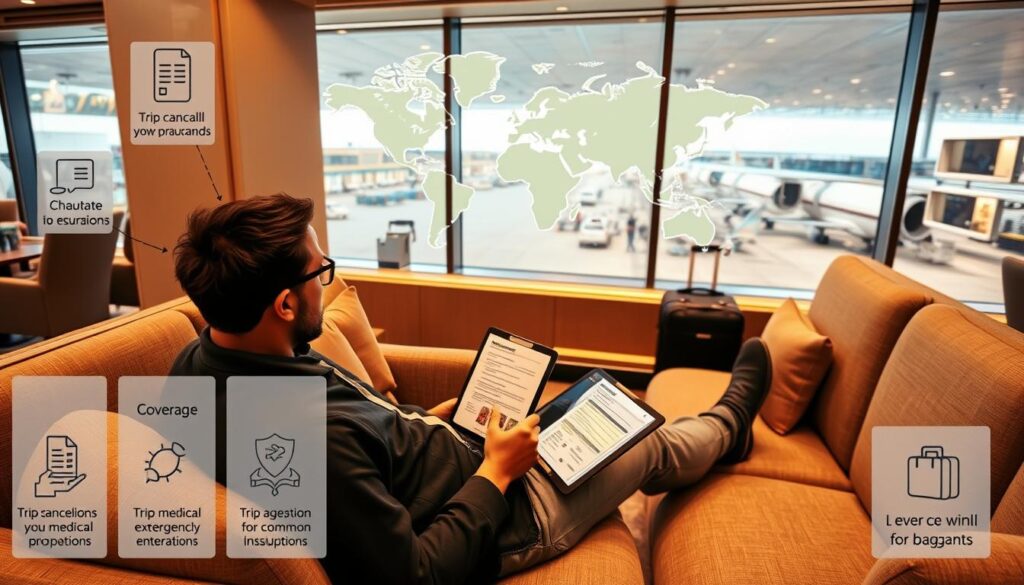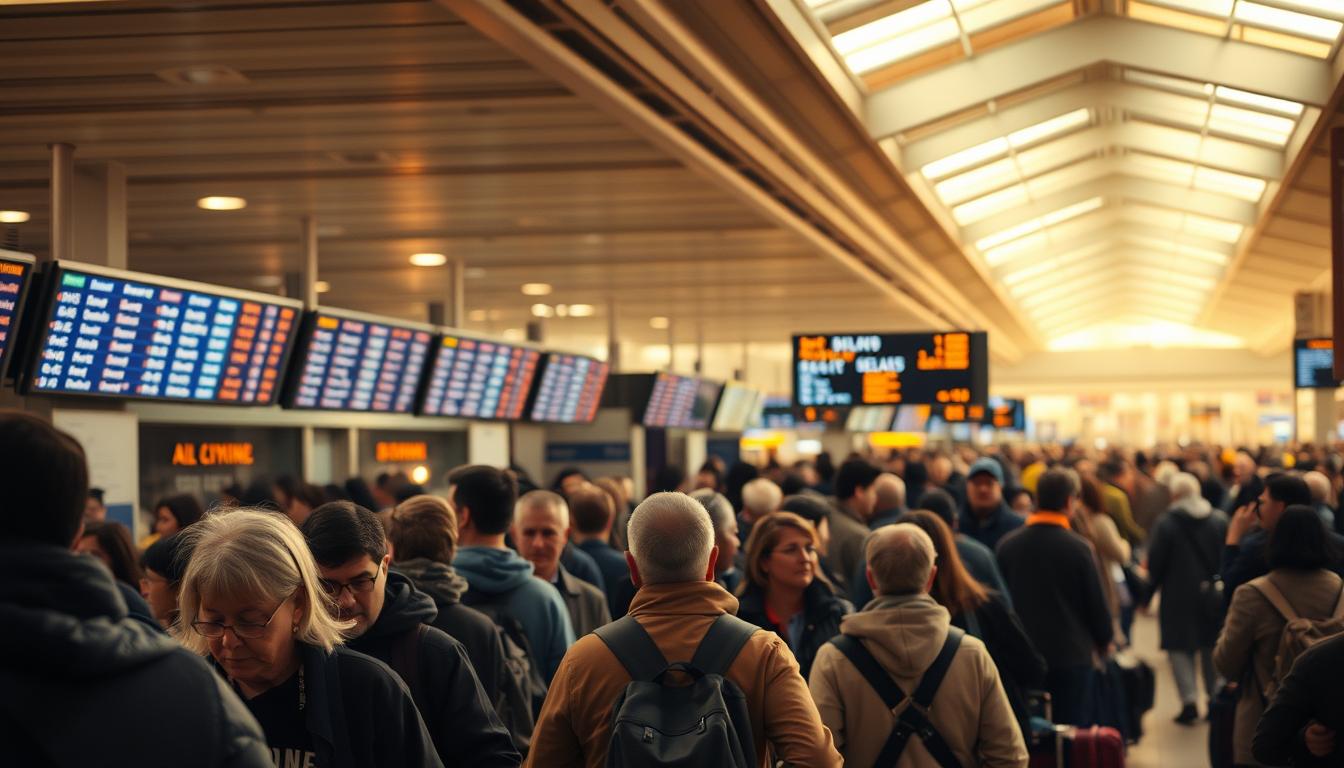Ever found yourself stuck in a transit lounge, waiting for your delayed flight to leave?
Daniel Durazo, a spokesperson with Allianz Travel, says, “Travel delay is the most common issue travelers face.”
A travel insurance guide is like a safety net. It covers costs for delays due to weather, aircraft issues, and more.
This article will show you why it’s key to be ready with the right coverage. This includes hotel cancellation policies.
Key Takeaways
- Understand the basics of a travel insurance guide
- Learn how flight delay coverage can save you money
- Discover the importance of hotel cancellation policies
- Find out how to choose the right travel insurance
- Know what to look for in a travel insurance policy
Understanding the Fundamentals of Travel Insurance
Before you start your next trip, it’s key to know what travel insurance covers. It’s made to protect you from unexpected events that might ruin your plans.
What Travel Insurance Actually Covers
Travel insurance offers many benefits to help you avoid financial losses. For example, travel delay insurance can help with costs from delays. It usually covers trip cancellations, interruptions, and delays, plus medical emergencies and evacuations.
- Trip cancellations or interruptions
- Travel delays
- Medical emergencies
- Lost or stolen luggage
Knowing what does travel insurance cover is key to using your policy wisely.
Common Misconceptions About Travel Coverage
Many people think travel insurance is only for big trips or international travel. But, travel insurance benefits are useful for any trip. It’s not just for medical emergencies; it can also cover trip cancellations or interruptions.
To get the most from your travel insurance, follow these travel insurance tips: always read the fine print, know what’s not covered, and learn how to file a claim.
Why Flight Delay Coverage Matters for Travelers
Flight delays can really mess up your plans. But, with the right insurance, you can handle the costs. Expenses for food, hotels, and travel can pile up fast.
Financial Protection During Unexpected Delays
Travel delay insurance gives you financial protection. It covers the extra costs when your flight is late. This way, you won’t have to worry about unexpected bills.
This is especially helpful for long delays. In these cases, the costs can grow quickly.
Additional Benefits Beyond Monetary Compensation
Some insurance plans offer more than just money back. They help with booking new flights or finding places to stay. When picking a plan, think about what extra help you need.
Look for plans that offer full support during delays. This makes traveling easier and less stressful.
To get the most from your insurance, know what your flight delay coverage includes. This way, you’re ready for anything travel throws your way.
Hotel Cancellation Policies and How Insurance Fills the Gaps
Travelers need to know about hotel cancellation policies to make smart choices. These policies can be strict, especially for non-refundable bookings. This leaves travelers at risk of losing money if their plans change.
Typical Hotel Cancellation Restrictions
Hotels usually have strict rules for canceling bookings. They often require cancellations a few days before check-in to avoid fees. Non-refundable bookings are especially risky because they don’t allow changes or cancellations without big fees.
- Strict timeframes for cancellations
- Penalties for late cancellations or changes
- Non-refundable bookings with no flexibility
How Travel Insurance Provides Additional Protection
Travel insurance acts as a safety net against hotel cancellation risks. It covers unexpected events, helping to reduce financial losses from trip cancellations or interruptions.
Key benefits include getting money back for non-refundable hotel bookings if you cancel due to illness, natural disasters, or travel advisories.
Navigating Non-Refundable Bookings
When booking non-refundable hotels, think about getting travel insurance for trip cancellations. This offers peace of mind and financial security. Compare different travel insurance policies to find the right one for you. Always read the fine print to know what’s covered.
Comprehensive Travel Insurance Guide, Flight Delay Coverage, and Hotel Cancellation Policies

As you get ready for your next trip, a good travel insurance guide is key. It helps you understand what’s covered and how to make claims. Travel insurance protects you from unexpected events like flight delays and hotel cancellations.
Comparing Basic vs. Premium Coverage Options
Choosing the right travel insurance policy is important. Basic coverage usually includes protection for trip cancellations due to illness or bad weather. Premium coverage, however, offers more, like higher limits for trip interruptions and medical emergencies.
Premium policies might also cover extra costs from flight delays, like hotel and food expenses. They often include 24/7 travel assistance for help with lost passports or medical evacuations.
Understanding Coverage Limits for Delays and Cancellations
Each policy has different coverage limits, and knowing these is key to being well-protected. For flight delays, some policies cover costs up to a certain daily amount. Others have a total limit for the delay.
For trip cancellations, the limit can be a percentage of the trip cost or the full amount. It’s important to check these limits to avoid surprises when making a claim.
Policy Exclusions You Need to Know
Every travel insurance policy has exclusions. These are situations or events not covered. Common exclusions include pre-existing medical conditions, travel to high-risk areas, and events related to war or terrorism.
It’s crucial to know these exclusions to choose the right policy. Always read the fine print and ask questions if you’re unsure about what’s covered.
How to Choose the Right Travel Insurance for Your Trip
To have a stress-free trip, picking the right travel insurance is key. You need to think about your personal risks, check the policy details, and compare prices. This way, you’ll find the best deal.
Assessing Your Specific Travel Risks
Think about your destination, the activities you’ll do, and your health. For example, if you’re into adventure sports, you’ll need a policy that covers those. Make a list of potential risks for your trip to find the right coverage.
Evaluating Coverage Limits and Exclusions
It’s important to know what your policy covers and what it doesn’t. Look for comprehensive coverage with good limits. Be sure to check for exclusions, like pre-existing medical conditions or travel to risky areas. Here are some key things to look at:
- Maximum coverage limits for trip cancellations and interruptions
- Coverage for medical emergencies and evacuations
- Exclusions for pre-existing conditions or specific activities
Price Comparison Strategies
Comparing prices is crucial to find the best value. Use online tools to compare quotes from different insurers. Don’t just look at the price, but also the coverage and services. Look for discounts or bundle deals to save money. Here are some tips for comparing prices:
- Get quotes from at least three different insurers
- Compare coverage limits, deductibles, and exclusions
- Check for additional benefits, such as 24/7 assistance
By carefully looking at your travel risks, checking policy details, and comparing prices, you can pick the right travel insurance. This ensures you have the right coverage for your trip.
Step-by-Step Process for Filing Flight Delay Claims

To claim flight delay compensation, follow a clear process. You need to gather documents and meet deadlines. This way, you get the flight delay coverage you deserve from your travel insurance.
Essential Documentation You’ll Need
Start by collecting all important documents. You’ll need:
- Delay verification from the airline
- Receipts for any expenses you had because of the delay
Obtaining Delay Verification from Airlines
Contact your airline to get delay verification. They will give you a document or number that proves the delay. This is key for your claim. As “The sooner you get this verification, the better your claim will be.”
Collecting Receipts for Reimbursable Expenses
Save all receipts for costs like food, lodging, and travel. These prove your expenses and are needed for reimbursement. A travel insurance expert says,
“Keeping detailed records of your expenses can make the claims process easier.”
Timeline for Submitting Claims
Submit your claim within the time your insurance allows. This is usually a few days to weeks after the delay. If you miss this, your claim might not be accepted. Always check your policy for the exact deadline.
Following Up on Your Claim Status
After you submit your claim, check in with your insurance provider. You can do this by phone or email. Being proactive can help fix any problems quickly. Remember, “staying persistent is crucial for getting your claim approved.” For more tips for buying travel insurance and understanding claims, look at your policy or talk to your provider.
Navigating Hotel Cancellation Reimbursements
To get hotel cancellation reimbursements, you need to know what documents and steps to take. When you buy travel insurance with hotel cancellation coverage, you’re protected. This is for when unexpected events make you cancel your hotel stay.
Required Proof for Hotel Cancellation Claims
To make a successful hotel cancellation claim, you must provide certain documents. These include:
- Cancellation confirmation documents from the hotel
- Records of communication with the hotel regarding the cancellation
Securing Cancellation Confirmation Documents
Getting a confirmation document from the hotel is key when you cancel. This proves you canceled your stay. Make sure the document has the hotel’s name, your booking number, and the cancellation date.
Documenting Communication with Hotels
Save all your talks with the hotel, like emails and phone calls. This evidence is important for your claim. It helps if there’s a disagreement about the cancellation.
Common Reasons Claims Get Denied
Knowing why claims are often denied can help you avoid mistakes. Some common reasons include:
- Insufficient documentation
- Missing deadlines for filing claims
- Failure to comply with policy terms and conditions
Being aware of these issues can help your claim go through smoothly. Always check your travel insurance policy and collect all needed documents before you submit your claim.
Real-World Scenarios: When Travel Insurance Saves Your Trip

Travel insurance is a must-have for any trip. It offers financial protection and peace of mind. You never know what might go wrong, but with travel insurance, you’re ready.
Case Study: Weather-Related Flight Cancellations
Weather can cause flight cancellations, especially during hurricane season. Travel insurance can help with these issues. It covers the costs of rebooking flights or provides compensation if your trip is canceled.
For example, if bad weather cancels your flight, your insurance can cover the non-refundable parts of your trip. This way, you won’t lose a lot of money.
Case Study: Emergency Situations Requiring Trip Cancellation
Emergency situations, like a sudden illness or family crisis, can force you to cancel your trip. Travel insurance can cover these unexpected events. It reimburses you for non-refundable bookings like hotel reservations and flight tickets.
It’s important to know what does travel insurance cover. Many policies include coverage for medical emergencies or family crises. This gives you a safety net when you need it most.
Case Study: Overbooking and Accommodation Issues
Overbooking can also ruin your travel plans. If your hotel is overbooked and you can’t check in, your insurance can help. Some policies offer compensation or help finding new accommodations.
By choosing the right policy, you can avoid stress. Knowing the travel insurance tips ensures you’re protected against these problems.
In conclusion, travel insurance is more than an add-on. It’s a key part of planning your trip. Understanding its benefits and how it can help in real-world scenarios lets you travel with confidence. You’ll know you’re protected against the unexpected.
Advanced Tips for Maximizing Your Travel Insurance Benefits
To get the most from your travel insurance, you need a smart plan. It’s not just about buying a policy. You must dive into the policy details and know how to file claims well. This means being active with your insurance’s terms and conditions.
Reading the Fine Print Effectively
Understanding the fine print is key to getting the most from your insurance. Read your policy carefully to see what’s covered and what’s not. Some policies have specific rules for filing claims, like notifying the insurer within a certain timeframe or needing detailed documents. As Consumer Reports says, “Knowing your policy’s terms can prevent surprises when you file a claim.”
Negotiating with Providers During Claims
At times, you might need to talk to your insurer to get what you deserve. This could mean giving more info or explaining your claim better. Being ready and not giving up can really help. For example, if your claim is turned down, you can appeal by adding more evidence or context. Choosing a provider known for fair claims handling is a good tip for buying travel insurance.
Combining Multiple Coverage Sources
You might have more than one insurance source, like credit card travel insurance or health insurance. Knowing how these work together can boost your benefits. For example, using your credit card’s travel insurance with your main policy could offer more protection. When looking for the best travel insurance plans, think about how they fit with other insurances you have.
By using these advanced tips, you can make the most of your travel insurance. Whether it’s understanding the fine print, negotiating with providers, or combining coverage, being proactive can greatly improve your travel experience.
Securing Peace of Mind for Future Travels
When planning your next trip, a good travel insurance guide is essential. It helps you choose the right insurance for your needs. This way, you can avoid worries about flight delays and hotel cancellations.
Travel insurance does more than just cover financial losses. It gives you peace of mind, letting you enjoy your trip without fear of the unexpected. With the right policy, you can handle risks and ensure your trip goes smoothly.
Using this guide, you can pick the best travel insurance for you. This lets you travel confidently, knowing you’re covered against many risks. Make sure to get the right insurance for your next adventure.
